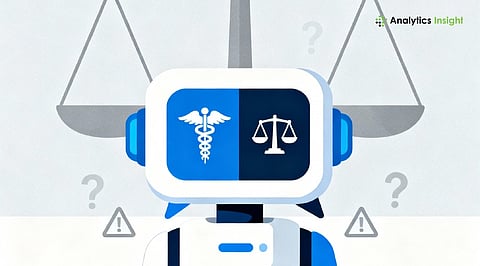The Ethics of AI Advice: Should Chatbots Ever Offer Medical or Legal Guidance?
Overview:
AI chatbots are rapidly entering sensitive spaces like healthcare and law, raising critical questions about safety, trust, and accountability.
While they can assist professionals with research, triage, and communication, unverified or autonomous advice can cause serious harm or misinformation.
The ethical path forward demands transparency, human oversight, and strict regulation to ensure chatbots support, not replace licensed experts.
AI tools like ChatGPT and other large language models (LLMs) have become an integral part of our lives. They provide quick answers, generate ideas, diagnose medical symptoms, and even help with legal questions. This efficiency thrills technology enthusiasts and alarms professionals.
As AI models become more advanced, an ethical question emerges: should chatbots ever be allowed to give medical or legal advice? The short answer is: not without strict safeguards. The longer answer requires evidence, professional standards, and the real harms that unchecked AI guidance can produce.
Trust, Adoption, and Real-world Risks
Clinicians are increasingly experimenting with AI. According to the American Medical Association, two in three physicians were using AI in diagnosis and treatment. This indicates that clinicians find practical value in these tools.
A major survey found 60% of US adults would be uncomfortable if their provider relied on AI for diagnosis or treatment recommendations. This gap between professional curiosity and patient caution matters ethically: when people place their health or legal rights at risk, the bar for reliability must be high.
A recent study found that chatbots are easily misled by erroneous medical details and may amplify misinformation rather than correct it. Another investigation showed that chatbots violate core mental-health ethics standards frequently. This increases risks when users treat these outputs as a therapeutic consensus.
Also Read: Ethics of AI in Finance: Can Algorithms Be Trusted with Your Money?
Professional Standards and Emerging Rules
American Bar Association issued new ethics guidance for lawyers. It mandates lawyers to understand AI limitations in maintaining competence, protecting confidentiality, and verifying outputs. Similar approaches are spreading globally.
Scientists have developed clinical guidance frameworks and reporting tools to analyze chatbots' performance.
These professionals focus on three pillars: competence, non-harm, and informed consent.
Competence means professionals should know limitations and verify their outputs. Non-harm mandates avoiding wrong approaches. Informed consent requires users to know when they are interacting with AI and understand its limitations.
Where Chatbots Can Add Value
Chatbots can provide reliable resources, warn users about health issues, and recommend urgent care to users.
Lawyers and clinicians can use chatbots to write documents and research topics under the supervision of experts.
Chatbots can perform administrative tasks such as scheduling a meeting, summarizing visits, or generating patient education material to reduce human workload.
What Did OpenAI Say?
ChatGPT's updated terms and conditions stated: “Provision of tailored advice that requires a license, such as legal or medical advice, without appropriate involvement by a licensed professional.”
Many users felt that ChatGPT would no longer be able to offer legal or medical advice to its users. However, Karan Singhal, the head of Health AI at OpenAI, posted on X: “Not true. Despite speculation, this is not a new change to our terms. Model behavior remains unchanged. ChatGPT has never been a substitute for professional advice, but it will continue to be a great resource to help people understand legal and health information”.
Practical Safeguards that Matter
If chatbots are allowed to answer health and legal queries, several safeguards are essential.
Users should be aware that they are talking to an AI, and the system’s training limitations. Any diagnosis, prescription, legal strategy, or important recommendation must be validated by an experienced professional.
Models should be trained for clinical and legal validation studies with transparent reporting to analyze the performance.
Confidential information must be handled under professional privacy standards.
Regulators should clarify who is responsible when AI suggestions lead to harm: the vendor, the users, or both.
Also Read: Top AI Tools to Enhance Medical Research Writing in 2025
The Ethical Bottom Line
It is important to value the speed of AI, but safety, transparency, and human responsibility should be kept in mind. When those conditions are met, chatbots can expand access and efficiency. When they are not, they can turn convenience into catastrophe.
Governments also need to improve AI literacy so that the public is able to assess the content. When people are able to recognise AI, they will be able to make more informed decisions.
So, people need to learn to question the source of advice, understand the capabilities and limitations of AI, and emphasize the use of critical thinking and common sense when interacting with AI-generated content.
In practical terms, this means cross-checking important information with trusted sources and including human experts.
.png)

